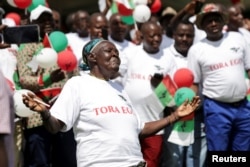Exiled Burundian activists and the Paris-based FIDH, or International Federation for Human Rights, are sending a strong message to world powers: It's time to impose more effective sanctions and other measures on President Pierre Nkurunziza and his government.
Burundian journalist Elyse Ngabire, who said she fled to France in 2015 after receiving death threats, said the international community must take measures that will force the ruling power into negotiations to end the crisis.
That call came as Burundians prepare to vote Thursday on a proposal to extend the president's term in office from five to seven years. That could allow Nkurunziza— already on his third mandate after a controversial 2015 election — to stay in office for another 14 years.
Rights groups say violence that erupted with that 2015 vote has killed more than 1,700 people and uprooted another 400,000. Burundi's bishops, the United States and the European Union and others have denounced violence, intimidation and other excesses targeting opponents of the proposed constitutional changes.
Burundian authorities deny they target their own citizens, claiming exiled activists are spreading propaganda.
FIDH deputy Africa bureau head Tcherina Jerolon issued a warning to international powers that helped secure the 2000 Arusha peace deal that helped to end years of civil war.
"There is a risk to reduce the whole credibility of the involvement of the international community in the peace process ... in this context and in this region," Jerolon said. "DRC is at risk, we have the situation in South Sudan, the situation in Central African Republic ... there really is a need to have consistency and coherence."
Burundian activist Pierre Claver Mbonimpa fears the fallout of the referendum and warned that Burundi could again tip into civil conflict.





